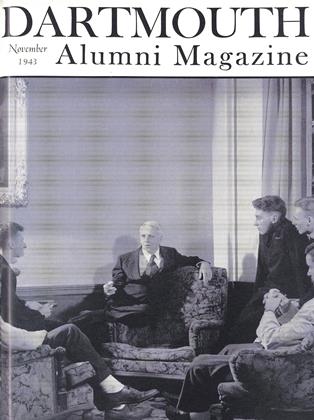VARIOUS OUTGIVINGS by prominent educators within recent weeks have indicated a very general agreement among them that what is usually called "streamlined" college education, while it may be necessitated by the exigency of war, is not a thing to be entered into lightly or inadvisedly as a permanent status. The argument against overdoing the expedient after the war emergency is past was ably summarized by Dean E. Gordon Bill in an article lately published in the Dartmouth Log— the nautically named weekly paper which is taking the place of TheDartmouth for the duration. Dean Bill, it should be remembered, hardly rates as anything like a stolidly standpat conservative, but rather as a progressive whose hospitality toward change is always strongly tinctured by common sense. He voices the idea that rushing students through college to an A.B. degree in about half the usual time is of dubious value at best and might be found deplorable if the custom were protracted into the years following the war.
Few will dispute the often made assertion that too little culture sticks to those who attain their baccalaureate degrees by the leisurely four-year route; but it seems entirely probable that even less will stick to them if the process is shortened to two years, or two and a half, as is done under the streamlined curriculum. It is laudable enough to wish that young men be not deprived entirely of college education by the unusual circumstances surrounding the present college generation; but when the need for all this hurry-hurry is over we shall do well, if we revert to something less breath-taking. Dean Bill apparently thinks the college of the future should not be so very different from the college of the pre-war period.
One is reminded vaguely of the remark of the tourist who boasted of going through the art galleries of the Louvre in half an hour, and who added that he could have done it in much less time if he had been on roller skates. The question in such a case is whether or not he would be any less benefited if he hadn't gone there at all; and similarly one may wonder whether those who go through college at railroad speed get enough to justify the time and effort required, save in the very exceptional cases which can be counted on the fingers. One who catches a glimpse of Niagara Falls from a car window may acquire an idea of that famous cataract's majesty and power, and can at least say he has seen it. One. who rushes through college in half the time his father did at least rubs elbows with education and (as in the case of George Sampson's petticoat) "knows it is there." But after all it is a makeshift forced on us by transitory conditions; and the fact that we are having to do it now doesn't prove that we ought to do the same thing all the time. Phileas Fogg, if memory serves, went around the world in eighty days. He probably didn't see too much of it, but got more out of the trip than does a man who makes the same journey by airplane in a week or less. There is still something to be said for the idea that if a thing is worth doing at all it is worth doing well.
AN UNPOSED THREESOME SYMBOLIC OF DARTMOUTH'S STUDENT RANKS TODAY
 View Full Issue
View Full Issue
More From This Issue
-
 Article
ArticleROBERT FROST RETURNS
November 1943 By CHARLES G. BOLTE '41 -
 Article
ArticleWILLIAM JEWETT TUCKER
November 1943 By ALEXANDER LAING '25 -
 Lettter from the Editor
Lettter from the EditorLetters from Dartmouth Men in the Armed Forces
November 1943 -
 Class Notes
Class Notes1918
November 1943 By ERNEST H. EARLEY, DONALD L. BARR -
 Class Notes
Class Notes1937
November 1943 By JOHN H. DEVLIN JR., FRANCIS T. FENN, JR. -
 Class Notes
Class Notes1917
November 1943 By MOTT D. BROWN JR., DONALD BROOKS
P. S. M.
-
 Article
ArticleThe Responsibility of the College to its Alumni
June 1924 By P. S. M. -
 Article
ArticleMemorializing Wheelock
December 1943 By P. S. M. -
 Article
ArticleWho Calls the Tune?
April 1944 By P. S. M. -
 Article
ArticlePost-War Planning
March 1945 By P. S. M. -
 Article
ArticleDartmouth Undying
October 1945 By P. S. M. -
 Article
ArticleIs Too Much Enough?
December 1945 By P. S. M.







